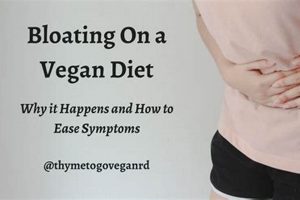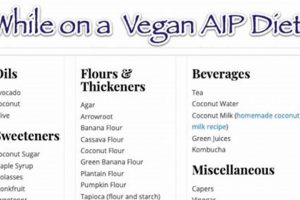
Gastrointestinal discomfort, characterized by a feeling of fullness, tightness, or swelling in the abdomen, can arise when individuals transition to plant-based eating patterns. This sensation is often accompanied by visible distention of... Read more »

Renal calculi, solid masses composed of crystals, can form within the kidneys and urinary tract. A dietary approach characterized by the exclusion of all animal products has implications for the formation and... Read more »

A specific dietary approach focused on plant-based foods, when poorly implemented, may inadvertently contribute to cognitive difficulties characterized by reduced mental clarity and impaired focus. This state, often described as a feeling... Read more »

This dietary approach combines the principles of the autoimmune protocol (AIP) with veganism. It removes common allergens and irritants associated with autoimmune conditions while adhering to a plant-based lifestyle that excludes all... Read more »

A plant-based eating approach combined with the dietary restrictions often necessary to manage Irritable Bowel Syndrome presents a unique set of considerations. This approach involves abstaining from all animal products while simultaneously... Read more »

A dietary approach centered on plant-based foods that deliberately restricts the intake of indigestible plant material. This method necessitates careful selection of fruits, vegetables, grains, and legumes, favoring those naturally lower in... Read more »

Plant-based culinary preparations that emphasize minimal lipid content are a dietary category designed to exclude all animal products while concurrently restricting the proportion of fats. This nutritional approach typically features fruits, vegetables,... Read more »

The relationship between fungal yeast overgrowth and plant-based nutrition is a topic of increasing interest. Dietary strategies can influence the balance of microorganisms within the body. For example, a high-sugar diet may... Read more »

Head pain experienced by individuals adhering to a plant-based eating regimen can arise from various factors. These may include nutrient deficiencies, dietary changes, or underlying health conditions that are exacerbated by specific... Read more »



